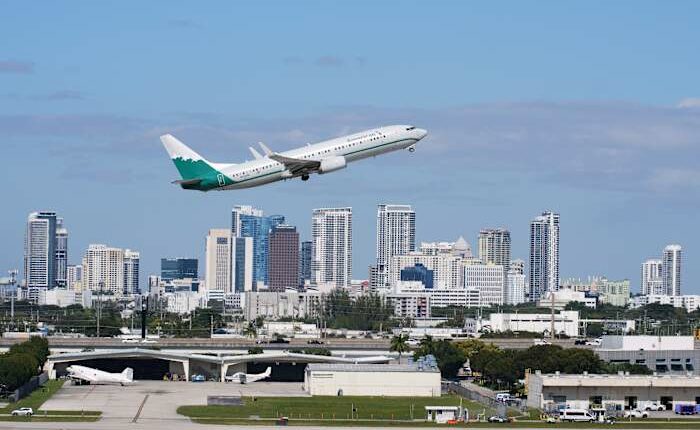Share this @internewscast.com

The unprecedented government shutdown that concluded last week sparked a rare moment of cross-party cooperation in Washington on Tuesday. Lawmakers from both sides of the aisle introduced a new bill aimed at ensuring air traffic controllers receive their salaries during any future shutdowns.
This proposed legislation seeks to finance salaries, operational costs, and other Federal Aviation Administration (FAA) initiatives by utilizing an underused flight insurance fund. This fund, established in the wake of the September 11 attacks, currently holds $2.6 billion. The bill’s proponents, who include key Republican and Democratic leaders from the House Transportation and Infrastructure Committee, believe that tapping into this fund could enhance the bill’s appeal. It promises to mitigate the financial burden of payroll disbursements.
Rep. Sam Graves, a Republican and the committee’s chair, expressed that the bill would ensure safety for travelers during future shutdowns. The bill is also supported by Democrats Rick Larsen and Andre Carson, alongside Republican Troy Nehls, who chairs the aviation subcommittee.
“We witnessed firsthand the vulnerabilities in our system when Congress fails to act,” Graves stated. “This legislation ensures that air traffic controllers, who handle one of the nation’s most demanding roles, receive their paychecks during funding gaps, safeguarding air traffic control, aviation safety, and public travel from shutdown consequences.”
The bill’s unveiling precedes a Senate subcommittee meeting scheduled for Wednesday, which aims to study the effects of the recent 43-day shutdown on the aviation sector.
However, the future of this bill, like similar measures introduced since the 2019 shutdown, remains uncertain. It is unclear if it will pass before the upcoming government funding deadline at the end of January. Most other proposals, such as one from Senator Jerry Moran, suggest using the aviation trust fund, which garners revenue from airline fees. However, these alternatives have been deemed more costly by the Congressional Budget Office.
Fixes have been proposed, but none approved
Over the years, lawmakers have tried a handful of fixes for a long-term solution to keep air traffic controllers and other essential aviation workers paid during funding lapses. The proposals often gained bipartisan attention, especially after the 35-day shutdown that ended in 2019 during Trump’s first term, but none made it over the finish line.
Moran’s bill, known as the Aviation Funding Stability Act, for example, is a recurring proposal in Congress that would allow the FAA to tap into the Airport and Airway Trust Fund. Lawmakers in both chambers have reintroduced versions of it over the years, including in 2019 and 2021.
The legislation resurfaced in March when Moran, the Republican chairman of the Senate subcommittee on Aviation, Space, and Innovation, put it forward. It came up again in September, weeks before the shutdown began, when Reps. Andre Carson and Steve Cohen, both Democrats, introduced it in the House.
The new bill introduced Tuesday would cut off the money if the insurance fund dips below $1 billion. But Transportation Committee staffers estimate that would still provide enough funding to keep FAA operating for four to six weeks.
Air traffic controllers stretched thin during shutdown
The issue gets so much attention because of all the flight delays and cancellations that happen during a shutdown when more air traffic controllers call out of work. The existing shortage of controllers is so severe that just a few absences in an airport tower or other FAA radar facility can cause problems.
The controllers — and the FAA technicians who maintain the equipment they rely on — are expected to continue working without pay during a shutdown to keep flights operating. But as the financial pressure mounted, some controllers picked up second jobs and may have taken time off to make some cash driving for Uber or DoorDash.
The delays got so bad during this fall’s shutdown that the government ordered airlines to cut some of their flights at 40 busy airports nationwide, in what the FAA said was a move to relieve pressure on the system and controllers. Thousands of flights were canceled before the FAA lifted the order entirely and airlines were able to resume normal operations Monday.
Why the insurance fund was created
The insurance fund the bill introduced Tuesday would use was created at a time when airlines were having trouble getting any insurance coverage after 9/11. For years, airlines paid into the fund regularly to get coverage from the government.
But by the early 2010s the insurance market for airlines had stabilized. Congress let the insurance program expire at the end of 2014. The fund still exists today to pay for claims an airline might file if the government commandeers one of its planes for a military operation or other use.
The last time a claim was made was after America’s withdrawal from Afghanistan in 2021. The fund has continued to grow as it collects interest.
Copyright 2025 The Associated Press. All rights reserved. This material may not be published, broadcast, rewritten or redistributed without permission.









